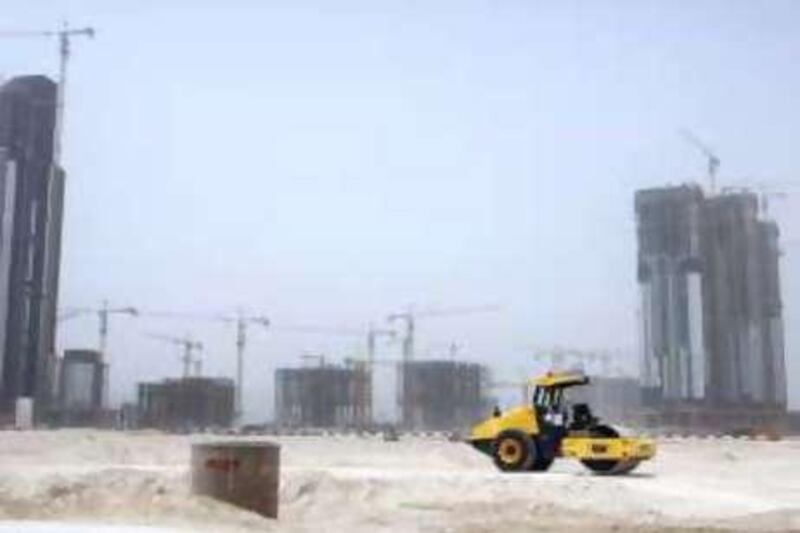Despite tight credit weighing down on prices of property purchased in the secondary market, developers say a combination of continued strong demand and limited supply will sustain prices in the long term. Prices have dipped in the past few days after dramatic growth in the first half of the year as property speculators found the supply of ready buyers drying up, while terms for financing home ownership have become more stringent.
"The severity of the global situation will bring challenges. Our real estate sector may see some short-term margin compression, mostly affecting the smaller developers, but overall the fundamentals have not changed and it [the sector] will prosper over the coming years," said Abubaker al Khouri, the managing director of Sorouh, in a speech today in London. "At the heart of that future growth lie the fundamentals of strong demand and as yet limited supply," he said, adding that he saw Abu Dhabi as the best property market worldwide. Earlier this month, the Chamber of Commerce forecast a shortage of at least 28,000 units this year.
Developers have not reduced their prices for new properties, but they are shifting their focus from speculative buyers to end-users. "What we have seen in the last six months is more-informed buyers, because now the market is approaching what we call the end-user market," said Zaid Ghoul, the chief financial officer of the Dubai-based developer Union Properties. "So they will be more interested in hooking themselves up with a developer that has reputation and that is large enough to deliver. We are raising prices as we go along because we are releasing a product that is almost complete. We are targeting the end-user market."
Prices of phase five in the developer's Uptown project in Motor City are ranging between Dh1,450 (US$395) and Dh1,550 per square foot, compared with Dh700 and Dh800 last year for similar types of units in previous phases. Given the current shortage of supply, developers whose projects are near completion focus on their near-term availability. Profile group is advertising Marina Heights, two towers in Abu Dhabi, as "the first project to be completed on Al Reem Island". Units are on offer at no less than Dh2,950 per sq ft. Hydra Properties's average residential price on Al Reem Island is about Dh3,000 per sq ft, with office space going for Dh3,700.
The only middle-income freehold area in Abu Dhabi remains Al Reef, from Manazel Real Estate, where units are changing hands at Dh1,100 per sq ft. "Although prices have recently dropped from what some may say were unrealistic prices, it is important to note that they have risen fast over the last months and people are still making profits," said Michael Wilde, the general manager of Manazel. "Our Al Reef units are still, even in these difficult times, selling at 70 per cent to 80 per cent above their original values, and are expected to increase in value once the market realises there is still a fundamental demand for quality completed product as they come on stream."
In Dubai, prices for off-plan homes have also fallen by about 10 per cent on the resale market but some segments are still in strong demand, according to developers. Mr Ghoul noted that "the villa type hasn't yet been fully saturated" nor has office space, or middle- to low-income housing in low-rise buildings comprising apartments of three bedrooms or less. Developers see the recent price drop and slowdown in sales as linked to negative sentiment about the global economy, rather than as tied to fundamentals of supply and demand.
"People are panicking. They need more information. Abu Dhabi is one of the healthiest markets in the world," said Sulaiman al Fahim, the chief executive of Hydra Properties. "There is no oversupply". In any case, the current crisis will not leave developers unaffected, according to analysts. "Some smaller developers that don't have much cash will have problems, as some banks have already stopped backing them," the head of sales at one property broker said. "I have quite a few plots of land to sell and can't do so because those who will have to develop them are thinking twice before buying."
Mr Khouri from Sorouh predicted a "rush to quality" by consumers and banks, both of which would look for solid real estate developers and developments to invest in. The larger and well capitalised companies such as Sorouh, which has projects worth more than Dh70 billion under development, would benefit from this, he suggested. As sales slow, some developers are finding ways to make their projects more attractive to investors and buyers. The developers behind Eco Towers, a pair of environmentally sustainable buildings within the Danet Abu Dhabi project, are requiring buyers to only pay a 2.5 per cent booking fee and are offering a more relaxed payment plan, executives said at a launch event today.
Luis Loureiro, the national head of sales and leasing services for Colliers International, said that most developers were waiting until early next year to make decisions about easing payment plans, but since Eco Towers was already 30 per cent financed by developers, they were able to act earlier. Others focus on "education". "Starting in mid-November," Mr Fahim said, "I will stop travelling to do a full campaign... I will myself be talking to the investors, telling them how to re-sell and how not to be greedy, and how they should wait to the long term. It is more about education."
* additional reporting by Bradley Hope ngillet@thenational.ae






